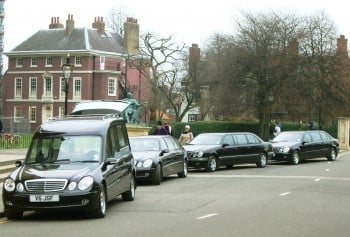Should I Have a Funeral Procession? Pros and Cons of the Processional
If you are planning the funeral of a loved one, an option that will arise during the decision-making process is whether or not you want to include a funeral procession. These processions, usually accomplished via a long line of cars that travel from the funeral service to the graveside service, are part of a long-standing tradition in which grief is a somber, community affair that shows respect to the deceased and his or her family.
These days, most processions are held for high-ranking, public figures or police officers and firefighters who have fallen in the line of duty. They are also common among families who choose a more traditional funeral—although it is certainly not a requirement. In fact, the decision to hold one usually comes down to a matter of preference, convenience, and cost.
Why Have a Funeral Procession?
Funeral homes are equipped to make the procession as easy as possible. Because your family will already be arriving to attend the funeral service, planning the procession is as easy as having everyone park in rows that will then pull out in an orderly fashion to proceed to the cemetery. In this way, you can keep the entire day on a strict timeline and also ensure that everyone knows where to go and how to get there.
This is especially helpful when you expect a large turnout of guests. Otherwise, there may be difficulty with parking at the cemetery and with ensuring that everyone has a seat.
Why Not to Have a Funeral Procession?
As with any funeral planning option, processions do come with an additional cost. Although driving itself is not more expensive, you typically have to hire a pilot car that will not only lead the way to the cemetery, but also make arrangements for blocking traffic and ensuring safety at intersections and red lights. Every state has different regulations regarding funeral procession laws, but most of the time, you will need a permit and/or police escort.
In addition, some funeral homes are located within walking distance of cemeteries, while others will require a lengthier drive. Always keep this in mind when deciding whether to have a procession or not. To go a few blocks through low traffic is one thing; taking a long line of cars through several busy intersections and roadways can make things more complicated.
Making Your Funeral Plans
For a traditional funeral that observes all the formalities, a funeral procession makes sense. For cremations or more low-key memorial services, it might be more than you need. Always talk with your funeral director and loved ones before you make a decision regarding the processional. Many people take comfort from these age-old practices, while others prefer to keep things more relaxed. Both options are perfectly acceptable and are in no way a reflection of your love for the deceased.




